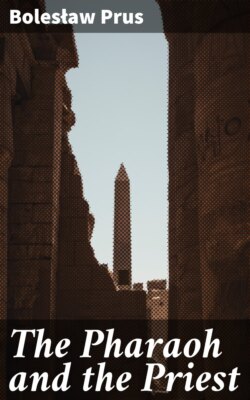Читать книгу The Pharaoh and the Priest - Bolesław Prus - Страница 11
На сайте Литреса книга снята с продажи.
Оглавление“Herhor is thy friend and my faithful servant. It was his persuasion that made thee heir to the throne. But—I—will not confide a corps to a youthful leader who lets himself be cut off from his army.”
“I joined it,” answered the crushed heir; “but Herhor commanded to march around two beetles.”
“Dost thou wish that a priest should make light of religion in the presence of the army?”
“My father,” whispered Rameses, with quivering voice, “to avoid spoiling the journey of the beetles a canal was destroyed, and a man was killed.”
“That man raised his own hands on himself.”
“But that was the fault of Herhor.”
“In the regiments which thou didst concentrate near Pi-Bailos thirty men died from over-exertion, and several hundred are sick.”
The prince dropped his head.
“Rameses,” continued the pharaoh, “through thy lips is speaking not a dignitary of the state who is thinking of the soundness of canals and the lives of laborers, but an angry person. Anger does not accord with justice any more than a falcon with a dove.”
“Oh, my father,” burst out the heir, “if anger carries me away, it is because I feel the ill-will of the priests and of Herhor.”
“But thou art thyself the grandson of a high priest; the priests taught thee. Thou hast learned more of their secrets than any other prince ever has.”
“I have learned their insatiable pride, and greed of power. And because I will abridge it they are my enemies. Herhor is not willing to give me even a corps, for he wishes to manage the whole army.”
When he had thrown out these incautious words, the heir was frightened. But the ruler raised his clear glance, and answered quietly,—
“I manage the state and the army. From me flow all commands and decisions. In this world I am the balance of Osiris, and I myself weigh the services of my servants, be they the heir, a minister, or the people. Imprudent would he be who should think that all intrigues are not known to me.”
“But, father, if thou hadst seen with thy own eyes the course of the manœuvres—”
“I might have seen a leader,” interrupted the pharaoh, “who in the decisive moment was chasing through the bushes after an Israelite maiden. But I do not wish to observe such stupidity.”
The prince fell at his father’s feet, and whispered,—
“Did Tutmosis speak to thee of that, lord?”
“Tutmosis is a child, just as thou art. He piles up debts as chief of staff in the corps of Memphis, and thinks in his heart that the eyes of the pharaoh cannot reach to his deeds in the desert.”
